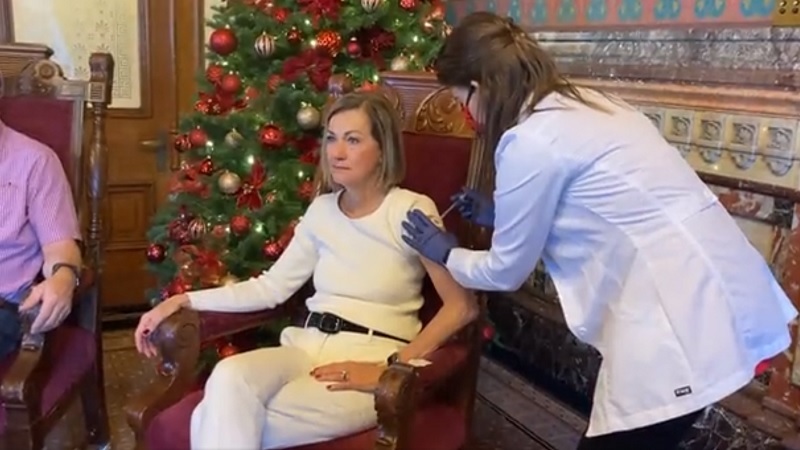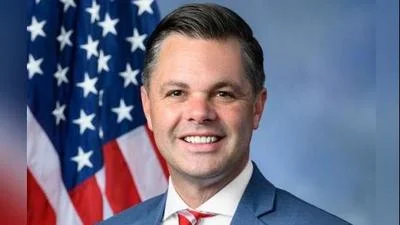Iowa Gov. Kim Reynolds receiving her Johnson & Johnson COVID-19 booster vaccine on Friday, Dec. 3 | twitter.com/IAGovernor/
Iowa Gov. Kim Reynolds receiving her Johnson & Johnson COVID-19 booster vaccine on Friday, Dec. 3 | twitter.com/IAGovernor/
Iowa Gov. Kim Reynolds and her husband, Kevin, recently got their COVID-19 booster vaccine to better protect themselves over the coming winter months, the governor said in a recent social media post.
In her Friday, Dec. 3 Twitter post, Reynolds also urged others to make a decision about being vaccinated and to respect the others in their decisions.
"Kevin and I got the COVID vaccine booster today, to increase our immunity as we head into the holiday season and the winter months ahead," Reynolds said in her Twitter post. "If you’re considering getting vaccinated or a booster, talk to your doctor, decide what’s best for you, and respect the decisions of others."
Reynolds, a Republican, has consistently urged Iowa adults be vaccinated against COVID-19 but "has fiercely resisted" imposing vaccine mandates in the state, according to a Des Moines Register news story.
COVID-19 cases were surging in Iowa the same day Reynolds and her husband received their booster shots, according to a WHO 13 news story.
Reynolds received her initial single-dose Johnson & Johnson vaccine in March, explaining that she waited so long to be sure it was safe and that nursing home residents and essential workers got it first, according to an Associated Press news story at the time.
She also defended her decision to get the Johnson & Johnson vaccine instead of others versions.
"Unfortunately, some critics are suggesting that the J&J vaccine is somehow inferior to those from Pfizer and Moderna because it's efficacy rate is lower," Reynolds said in the AP news story. "This information is misleading and quite frankly it’s irresponsible."
In a video posted to her Twitter post last week, Reynolds recalled her response to COVID-19 early in the still-ongoing pandemic.
"When I first heard of COVID-19, it was a very uncertain and troubling time," Reynolds said. "Nearly two years later, that's no longer the case. We understand the virus now, we know what to expect and how to respond, and we've proven we can manage it sensibly and effectively."
COVID-19 cases continue to fluctuate and variants, such as delta and the recently emerged omicron have occured, "and this will continue because viruses change to survive," Reynolds said.
"But we've also seen the difference that the vaccine has made in preventing infections in most people and protecting others from serious illness," she said. "And that's why I chose to get vacinated in March, and it's why I'm getting a booster shot today. Reinfections are now on the rise. People who've had COVID before are getting it again and this is simply because immunity decreases over time, whether you've had natural immunity from the virus or whether you got the vaccine."
Reynolds concluded by saying COVID-19 can't be controlled "but we can control how we respond to it."
"We now have the information tools we need to manage it and it's up to each of us to choose how best to do that," Reynolds continued. "If you're considering getting vaccinated for the first time or getting the booster, I encourage you to talk to your doctor and then do what's best for you. Whatever you decide, let's respect the decisions of every individual and let's all enjoy a happy and healthy holiday season."






 Alerts Sign-up
Alerts Sign-up